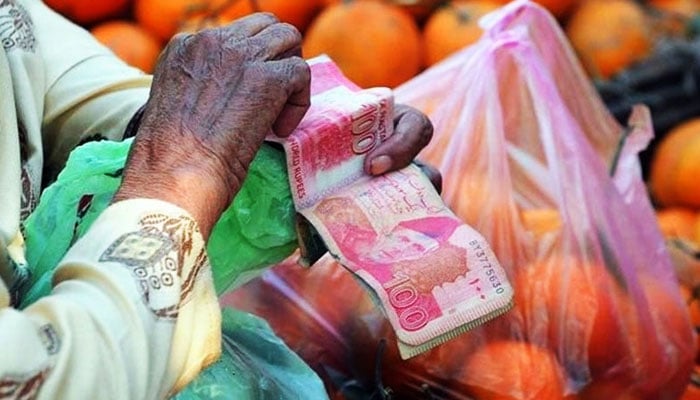Weekly inflation falls 0.34pc
KARACHI: Weekly inflation eased to 3.57 per cent year-on-year for the week ending December 5, marking a slight improvement from 5.13 per cent recorded the previous week, according to the Pakistan Bureau of Statistics (PBS). The Sensitive Price Indicator (SPI), which monitors price changes in essential commodities, also registered a week-on-week decline of 0.34 per cent.
The SPI tracks 51 essential items across 50 markets in 17 cities. This week, the prices of 18 items rose, 10 decreased, and 23 remained unchanged. The largest price drops were observed in tomatoes, which plunged 25.15 per cent, followed by chicken, down 9.9 per cent, and mash pulse, which fell 1.67 per cent. Other commodities, including gram pulse, wheat flour, and basmati broken rice, saw more modest declines, ranging between 0.71 per cent and 0.37 per cent.
Several items experienced price hikes, with garlic leading the list at a 1.83 per cent increase, followed by vegetable ghee (2.5 kg) at 1.72 per cent, and potatoes at 1.69 per cent. Fuel prices edged upward as well, with diesel and petrol climbing 1.27 per cent and 1.48 per cent, respectively. Cooking oil, bananas and firewood also recorded smaller increases, indicating rising costs for household essentials.
The report highlights that inflation continues to impact income groups differently. Lower-income households, earning below Rs17,732 per month, saw a 0.44 per cent weekly drop in prices, while those with earnings above Rs44,175 experienced a smaller 0.28 per cent decrease. However, on a year-on-year basis, both groups faced inflationary pressures, with the highest-income group aligning with the national average of a 3.57 per cent rise in prices.
A closer look at annual trends reveals sharp increases in certain key commodities. Gram pulse surged by 65.64 per cent, moong pulse rose by 37.83 per cent, and powdered milk became 25.74 per cent more expensive compared to the same period last year. Non-food items also saw notable hikes, such as ladies’ sandals, which soared by 75.09 per cent, and shirting, up by 15.03 per cent.
In contrast, some items brought relief to consumers with substantial price drops. Wheat flour prices fell by 35.4 per cent, while diesel and petrol prices declined by 10.77 per cent and 10.33 per cent, respectively. This trend was also reflected in basmati rice, tea, and chicken, which recorded moderate decreases.
-
 Leonardo DiCaprio's Co-star Reflects On His Viral Moment At Golden Globes
Leonardo DiCaprio's Co-star Reflects On His Viral Moment At Golden Globes -
 SpaceX Pivots From Mars Plans To Prioritize 2027 Moon Landing
SpaceX Pivots From Mars Plans To Prioritize 2027 Moon Landing -
 J. Cole Brings Back Old-school CD Sales For 'The Fall-Off' Release
J. Cole Brings Back Old-school CD Sales For 'The Fall-Off' Release -
 King Charles Still Cares About Meghan Markle
King Charles Still Cares About Meghan Markle -
 GTA 6 Built By Hand, Street By Street, Rockstar Confirms Ahead Of Launch
GTA 6 Built By Hand, Street By Street, Rockstar Confirms Ahead Of Launch -
 Funeral Home Owner Sentenced To 40 Years For Selling Corpses, Faking Ashes
Funeral Home Owner Sentenced To 40 Years For Selling Corpses, Faking Ashes -
 Why Is Thor Portrayed Differently In Marvel Movies?
Why Is Thor Portrayed Differently In Marvel Movies? -
 Dutch Seismologist Hints At 'surprise’ Quake In Coming Days
Dutch Seismologist Hints At 'surprise’ Quake In Coming Days -
 Australia’s Liberal-National Coalition Reunites After Brief Split Over Hate Laws
Australia’s Liberal-National Coalition Reunites After Brief Split Over Hate Laws -
 DC Director Gives Hopeful Message As Questions Raised Over 'Blue Beetle's Future
DC Director Gives Hopeful Message As Questions Raised Over 'Blue Beetle's Future -
 King Charles New Plans For Andrew In Norfolk Exposed
King Charles New Plans For Andrew In Norfolk Exposed -
 What You Need To Know About Ischemic Stroke
What You Need To Know About Ischemic Stroke -
 Shocking Reason Behind Type 2 Diabetes Revealed By Scientists
Shocking Reason Behind Type 2 Diabetes Revealed By Scientists -
 SpaceX Cleared For NASA Crew-12 Launch After Falcon 9 Review
SpaceX Cleared For NASA Crew-12 Launch After Falcon 9 Review -
 Meghan Markle Gives Old Hollywood Vibes In New Photos At Glitzy Event
Meghan Markle Gives Old Hollywood Vibes In New Photos At Glitzy Event -
 Simple 'finger Test' Unveils Lung Cancer Diagnosis
Simple 'finger Test' Unveils Lung Cancer Diagnosis




